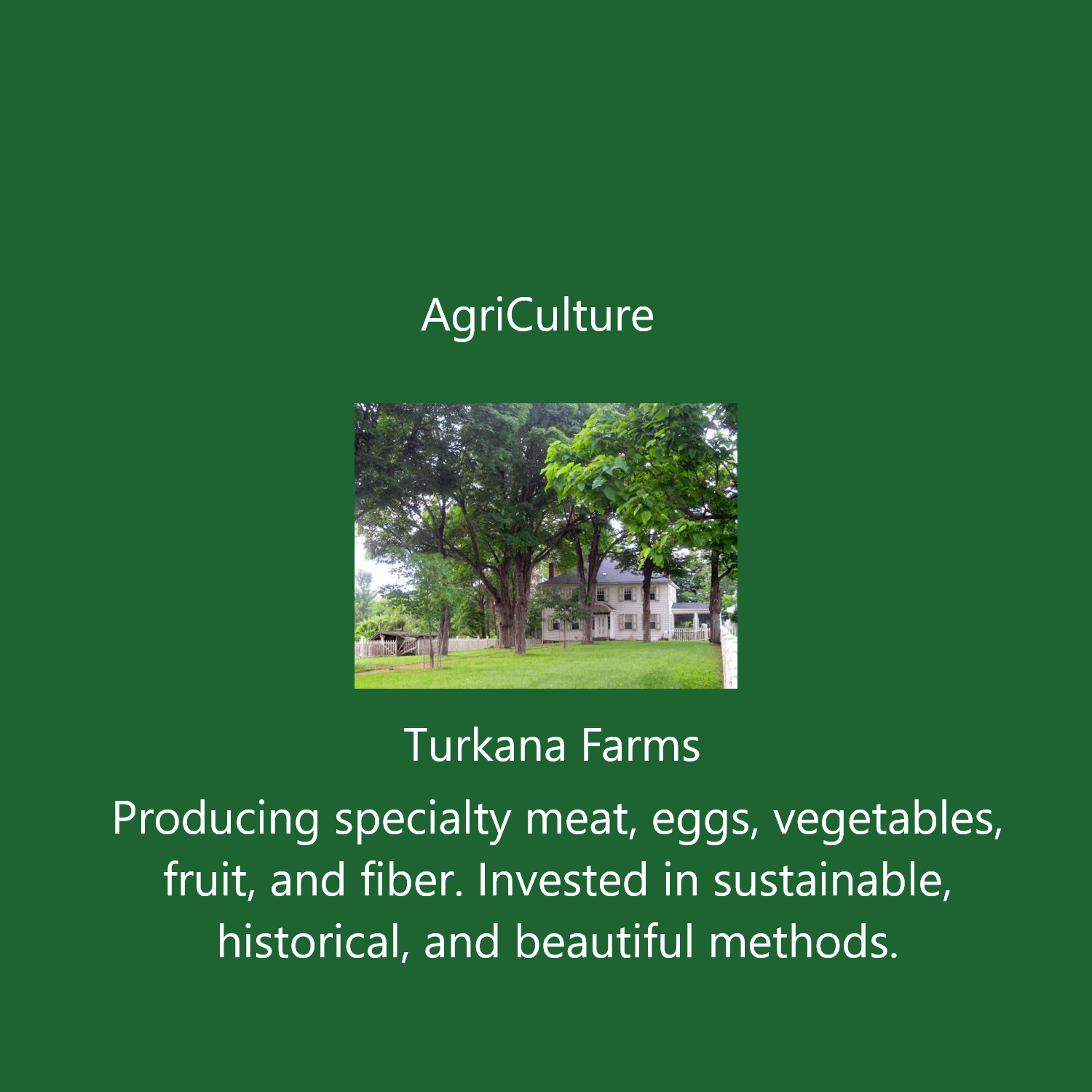
| Three Farmtrepreneurs Hi all. Mark here. Sorry the bulletin is coming out late this week, but as I warned you last week I wanted to make this a follow up report on our very important business meeting about how to make the farm profitable. After all, farming is, in Troy and Victoria's life plan, a career, a livelihood. And we agreed that in today's agricultural economy, a small farm can only make it by seeking every revenue stream it can possibly find. So we sat down Sunday with a stated purpose of thinking outside the box, taking advantage of existing farm resources in new ways, or creating entirely different products or services. Someplace where we could lead the way.As I promised last week, here are the minutes of our deliberations.I called the meeting to order. "Ok guys, what are our suggestions?"Right off the bat Troy, ever the jokester, replied: "Well, I was thinking we have this incredible ridge of shale out in the pasture. What about artisanal fracking?"Victoria shot it down immediately: "C'mon Troy, please let's take this seriously. You want a successful farm, not a successful poisoned sinkhole. Fracking is environmentally irresponsible, even if you call it 'artisanal'. How about something a little less impactful? For example, maybe sell advertising space on the side of the barn?"It was my turn to object. "Hey, we're supposed to stand for not just small farming, but aesthetically pleasing farming as well. That doesn't seem to jibe with our image. It would probably hurt sales of our existing farm products if people associated us with a huge neon Coca Cola sign on the side of the barn."I continued: "But I agree that we need to look at 'monetizing' what we already have. Not creating new burdens on us, just new revenue sources. And as I was searching on the internet for ideas, one that came to me was putting a pay wall on our Farm Bulletin. You know, how these various websites say 'You have two free articles left this month. Press this button to subscribe and get free unlimited access to our bulletin and bulletin archive.' We're already writing the bulletin, why not get paid something by those who read it?"Well, this idea really appealed to both Troy and Victoria. Why not get paid for something you already do? We took a vote and unanimously adopted the pay wall, pricing subscriptions at what I'm sure you'll agree is a very modest $5 per year. That may seem like chicken feed to you, but with all our subscribers it adds up, so much so that for us it really does mean chicken feed -- if you all sign up we'll have enough to pay our feed bill for the chickens for an entire year. If you see a message asking you to pay for this bulletin after the next three issues come out, do not be surprised. It's technologically feasible and we figure if you really like it, you'll pay.At this, Victoria said, "Along those lines, I was reading in the New York Times Science section that people would be much healthier and have far fewer food allergies if their immune systems worked properly. And the reason that more people have those allergies nowadays is that they live in environments that are too sterile. Exposure to bacteria and pathogens, especially for young children, in the long term makes them healthier. As the article said, it may be good for you to pick your nose -- and eat it." ([New York Times, March 12, 2019, "Your Environment is Cleaner. Your Immune System Has Never Been so Unprepared])(https://www.nytimes.com/2019/03/12/health/immune-system-allergies.html)"So?" I said."Think about it," Victoria replied. "We have a perfect environment here to expose people to pathogens and immune stimulating substances. Ragweed pollen in the gardens. Chick poop in the chicken coop, sheep poop in the barn, etc. I've always hoped to do educational programs here for kids. Maybe what we can educate, unlike other farms, is children's immune systems.""I've talked to a couple of immunologists at Duke and Harvard. They told me about clinical trials at several major medical centers for something called Progressive Immune Conditioning ("PIC"). They convinced me that we could set up a graduated exposure program for kids, especially kids who seem to be developing bad allergies young. We're walking around doing chores anyway, and we can just have a group of kids tagging along -- tasting the weed tassels and rubbing their hands in the poop. Week by week, as we increase the range and intensity of exposures, their immune systems will strengthen. And they may even end up helping out a little with chores. At $10 a kid a week, this could be a great revenue stream."We debated the wisdom of having young kids running around and all the potential hazards they could encounter. But on balance, we decided that at $10 a kid a week, we could afford to take the risk. So this proposal was again unanimously added to the list."And you, Troy," I asked. "Do you have any suggestions that are not just a joke?""Actually, I do," Troy said. "I was reading last week in the Cornell Cooperative Extension newsletter that the best way to dispose of diseased animals that die is to bury them in the compost pile. There is a lot of literature on this. (See Composting Animal Mortalities.) The heat of the decomposing organic matter essentially incinerates anything placed in there, as is evident from the wisps of steam constantly rising out of the pile. Any pathogens in the diseased animals get cooked and the matter is broken down into rich soil.""And then it hit me, we are already composting and have a massive compost pile on top of the hill behind the barn. Why not take advantage of that and offer a crucial service to the public? I’m sure plenty of people want to take something solid and turn it into soil with a little microbe magic. They might not even care about making soil. Maybe they just want something hidden under a giant pile of manure. I call it ‘No Questions Asked Composting.’""I have to admit, I already tried to pilot this idea by running a little ad on Craig's List Hudson Valley. And we've had some interesting inquiries. One guy from Staten Island called and asked if a Cadillac Limousine could get up to the compost pile. He said his brothers had something in the trunk they'd like to use this service for, and they would pay us a premium if they could deliver and dig it in themselves sometime after 1 a.m. They were really willing to pay a nice hefty sum, and they said they'd deliver payment in cash.""You really think everyone will pay that well?" I asked.Troy replied, "Nah, in fact I had another call a little bit later from a guy in Washington who asked if we had ‘government rates.’ He said he had some 300 page report he needed taken care of. I told him I didn’t care what it was, and that we don’t offer discounts to governments. He sounded like a real cheapskate, and in fact I thought he might stiff us. Doesn't matter, though, the first guy said the family could supply us with a pretty steady stream of business."Our debate was short. With No Questions Asked Composting, we figured, we could make out like bandits, and again this novel proposal to generate farm revenue was adopted unanimously.So, dear farm customers, get ready for some changes in our farming model. And if you want to take advantage of No Questions Asked Composting, or Progressive Immune Conditioning, or even just want to continue receiving this Bulletin, simply go to our Turkana Farms website and click on the tab labeled "April Fools." |
| THIS WEEK'S OFFERINGSFROM LAST FALL'S GARDEN HARVEST:FROZEN SQUASH (SHREDDED, TROMBONCINO), GREAT FOR FRITTERS, $2/LB.EGGS: Production is now in overdrive. We can handle all your orders. $5/dozMEATS: We keep some on hand, but it helps to order ahead in case we need to retrieve from our stash in the big commercial freezerGEESE: One remaining, about 8.5 lbs. $10/lb.TURKEYS: A few small ones left over and frozen $11/lb .GUINEA FOWL, frozen $7/lb (half the price of the Union Sq. Farmers Market). These are excellent 3 lb. or so birds.ROASTING CHICKENS - Freedom Rangers, $6/lb, range of sizes, mostly in the 4 to 5 lb. rangeLAMB: Loin chops at $14 a pound, riblets $8/lb, rib rack roasts $14/lb, small leg roasts $14/lb, We will soon replenish our lamb supply as it's time for several to go to market.PORK: Loin pork chops, $12/lb (2 to a pack, btwn 1 and 1.5 lbs), Jowl (roughly 2 to 3 lbs each), $12/lb, Spare ribs and country ribs $7/lb baby back ribs $8/lb fresh ham roasts (2 to 3 lbs), $12/lb picnic or Boston butt roasts (roughly 2 lbs) $12/lb smoked bacon, $12/lb ground pork $7/lb Kielbasa $8/lbBEEF the last of our diminishing stash Sirloin steaks, $14/lb. kidney, heart etc. $1/lbDUCKS: Last year we did Pekin ducks. The males are not so different in size from the females, and these are nice meaty birds, most between 5 and 7 lbs. Also $7/lb. We have to retrieve these from the big freezer, so please order a week ahead. |
| FARM PICKUPS:Email us your order at [email protected], and let us know when you'd like to pick up your order. It will be put out for you on the side screened porch of the farmhouse (110 Lasher Ave., Germantown) in a bag. You can leave cash or a check in the now famous pineapple on the porch table. Regular pickup times are Saturday and Sunday from 11 a.m. to 1 p.m. and 4 p.m. to 5 p.m., other days by arrangement. If you have questions, don't hesitate to call at 518-537-3815 or email. |
| HEAR OUR SHOWIf you'd enjoy hearing these bulletins out loud instead of reading them, we broadcast them on Robin Hood Radio, the nation's smallest NPR station. You can find it on FM 91.9, AM 1020, WBSL-FM 91.7 "The Voice of Berkshire School" or streaming on the web at www.robinhoodradio.com, where podcasts of past broadcasts are also available under the title AgriCulture in the "On Demand" section. FM 91.7 "The Voice of Berkshire School"can be heard from just south of Pittsfield to the CT border. You can hear the station on WHDD FM 91.9 from Ashley Falls, MA down through the Cornwalls and in NY from just south of Hillsdale down to Dover Plains. You can hear the station on AM1020 from Stockbridge, MA to Kent and from Poughkeepsie to Pawling to Kent, Goshen, Torrington, Norfolk, and Ashley. Recently added for those in the Route 22 corridor from Ancram down to Pawling is FM frequency 97.5 And of course you can listen in our own neighborhood of Southwestern Columbia and Northwestern Dutchess County, where it is being broadcast from Annandale on Hudson, 88.1 FM. |
| FOLLOW USThe bulletins may also now be found in written form on line as well, at the Germantown, NY, portal ofhttp://imby.com/germantown/userblogs/agriculture-turkana-farms/Follow us on instagram @turkanafarms or on facebook |

Turkana Farms, LLC, is a small scale producer of heritage breed livestock and a wide array of vegetables and berries on just over 39...

TURKANA FARMS, LLCGreen E-Market Bulletin March 3, 2024Eric soaks up apricity Photo by Mark ScherzerApricityHi all, Mark here.Feeling the warm winter sun on my...

Last week after I pondered culling my two oldest ewes for the benefit of the rest of the flock, my friend Steve excitedly texted:...